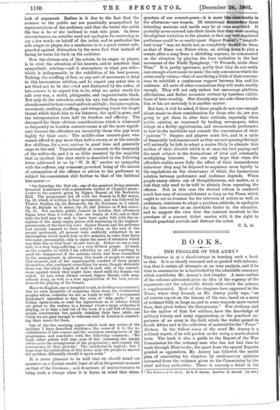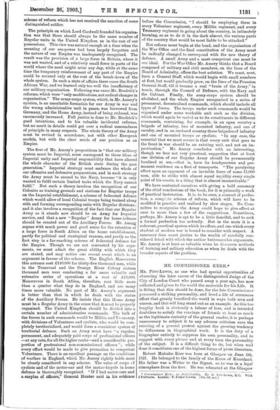BOOKS.
THE PROBLEM OF THE ARMY.*
THE reviewer is at a disadvantage in treating such a book as this. It is so closely reasoned and so packed with informa- tion that it resists all attempts at an easy analysis, and if he tries to summarise he is forestalled by the admirable summary which constitutes Mr. Amery's last chapter. A mere outline of the reforms advocated gives no idea of the cogency of the arguments and the admirable details with which the scheme is supplemented. Most of the chapters have appeared in the Times, where they formed, as Mr. Amery justly says, "an ad interim,report on the lessons of the war, based on a mass of evidence fully as large as, and in some respects more varied than, that given before the Commission." Few civilians, and for the matter of that few soldiers, have the knowledge of military history and army organisation, or the practical ex- perience of an army in the field, which the writer gained in South Africa and in the collection of material for the "Times " History. In the fullest sense of the word Mr. Amery is a military expert, if he will pardon us for using a much-abused term. The book is also a guide to the Report of the War Commission for the ordinary man who has not had time to wade through Blue-books; for apart from the special Reports printed as appendices, Mr. Amery has followed the useful plan of annotating his chapters by confirmatory opinions extracted from the evidence given to the Commission by the chief military authorities. There is scarcely a detail in his • The Problem of the Army. By L. S. Amery. London: E. Arnold. [es. net.]
scheme of reform which has not received the sanction of some distinguished soldier.
The principle on which Lord Cardwell founded his organisa- tion was that there should always be the same number of Regular units in the United Kingdom as in the rest of our possessions. This view was natural enough at a time when the meaning of our sea-power had been largely forgotten and the nature of our Empire was inadequately recognised. The result was the provision of a large force in Britain, where it was not wanted, and of a relatively small force in parts of the world where the need might arise any day, while at the same time the temporary reinforcement of any part of the Empire could be secured only at the cost of the break-down of the whole system. In such a state of affairs then; came the South African War, and we learned only too well the insufficiency of our military organisation. Following war came Mr. Brodrick's reforms, which were " only modifications, not radical changes in organisation." The army-corps system, which, in Mr. Amery's opinion, is an unsuitable formation for our Army in war and the wrong administrative unit in peace, was borrowed from Germany, and the Home Army, instead of being reduced, was enormously increased. Full justice is done to Mr. Brodrick's good intentions, and to his valuable incidental reforms, but no merit in details could get over a radical unsoundness of principle in many respects. The whole theory of the Army must be revised in accordance, not with other European models, but with the clear needs of our position as an Empire.
The first of Mr. Amery's propositions is " that our military system must be Imperial, must correspond to those ideas of Imperial unity and Imperial responsibility that have altered the whole character of the British state during the past generation." Imperial strategy must embrace the whole of our offensive and defensive preparations, and in such strategy the Army must be second to the Navy, because "it is only wanted to fulfil certain limited tasks which the Navy cannot fulfil." But such a theory involves the recognition of our Colonies as training grounds and stations for Regular troops on the Imperial establishment, a scheme of federated defence which would allow of local Colonial troops being trained along with and forming corresponding units with Regular divisions ; and it also involves a recognition of the fact that our Regular Army as it stands now should be an Army for Imperial service, and that a new " Regular " Army for home defence should be created out of the Auxiliary Forces. Mr. Amery argues with much power and good sense for the retention of a large force in South Africa on the home establishment, partly for political and strategical reasons, and partly as the first step in a far-reaching scheme of federated defence for the. Empire. Though we are not converted by his argu- ments, we must admit the great ability with which they are stated, and may notice one recent event which is an argument in favour of the scheme. The English Manoeuvres this autumn cost £140,000 for thirty-five thousand men, while in the Transvaal and the Orange River Colony sixteen thousand men were conducting a far more valuable and extensive series of operations at a cost of £18,000. Manoeuvres in South Africa, therefore, cost little more than a quarter what they do in England, and are many times more valuable. No part of Mr. Amery's argument is better than that in which he deals with the status of the Auxiliary Forces. He insists that this Home Army must be a Regular Army in the sense that it must be properly organised. The United Kingdom should be divided into a certain number of administrative commands. The bulk of the forces in such commands would be Militia and Yeomanry, with divisions of Volunteers and cyclists, who would be com- pletely territorialised, and would form a consistent system of territorial defence. Such an Army must have " a regular, permanent, and adequately paid corps of professional officers —at any rate, for all the higher ranks—and a considerable pro- portion of professional non-commissioned officers "; while every effort would be made to give promotion to competent Volunteers. There is an excellent passage on the conditions of warfare in England, which Mr. Amery lightly holds must be closely considered in any scheme. The value of corps cf cyclists and of the motor-car and the motor-bicycle in home defence is thoroughly recognised. "If I had motor-cars and a surplus of Officers," General Hunter said in his evidence before the Commission, "I should be employing them in every Volunteer regiment, every Militia regiment, and every Yeomanry regiment in going about the country, in intimately learning, so as to do it in the dark almost, the various parts of the country that would be most liable to be attacked."
But reform must begin at the head, and the organisation of the War Office and the final constitution of the Army must be radically changed to correspond with the new theory of defence. A small Army and a most competent one must be our ideal. For the War Office Mr. Amery thinks that a Board composed of military and civil members, on the lines of the Board of Admiralty, offers the best solution. We must, next, have a General Staff, which would begin with small numbers at first, but would gradually grow, on the lines of the Prussian General Staff, till it became a real "brain of the Army," in touch, through the Council of Defence, with the Navy and the Cabinet. Finally, the army-corps system should be abolished, and the whole Empire reorganised in a series of permanent, decentralised commands, which should include all types of forces. The troops under such commands would be organised under some workable unit such as the division, which would again be varied as to its constituents in different commands, containing, for example, in an open country a brigade of infantry, two of mounted infantry, and one of cavalry, and in an enclosed country three brigades of infantry and one of mounted troops or cyclists. " In any case, the essential that we must secure is that every unit that goes to the front in war should be an existing unit, and not an im- provisation." Mr. Amery concludes with an interesting, though we fear not very practical, suggestion that at least one division of our Regular Army should be permanently localised at sea,—that is, have its headquarters and per- manent residence on a fleet of transports. " The paralysing effect upon an opponent of an invisible force of some 15,000 men, able to strike with almost equal rapidity every single point of his coasts, is a thing that is almost inconceivable."
We have contented ourselves with giving a bald summary of the chief conclusions of the book, for it is primarily a work of practical instruction. It is, to be sure, a counsel of perfec- tion, a complete scheme of reform, which will have to be modified in practice and realised by slow stages. No Com- mittee to reorganise the Army could hope to give effect at once to more than a few of the suggestions. Sometimes, perhaps, Mr. Amery is apt to be a little fanciful, and to seek a formal perfection too ardently. But in the main it is a coherent, practical system which be offers, and one which every student of modern war is bound to consider with respect. A summary does scant justice to the wealth of carefully con- sidered detail with which the author buttresses his arguments. Mr. Amery is at least as valuable when he discusses methods of training and military education as when he deals with the broader aspects of the problem.







































 Previous page
Previous page